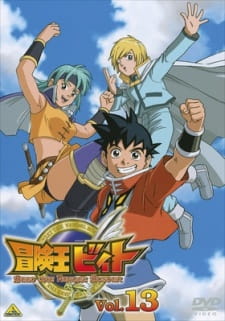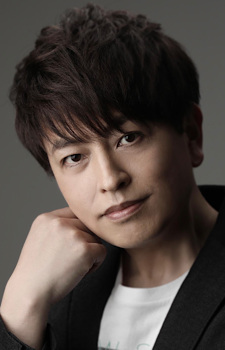
Bouken Ou Beet
Summary: It is the dark century and the people are suffering under the rule of the devil, Vandel, who is able to manipulate monsters. The Vandel Busters are a group of people who hunt these devils, and among them, the Zenon Squad is known to be the strongest busters on the continent. A young boy, Beet, dreams of joining the Zenon Squad. However, one day, as a result of Beet's fault, the Zenon squad was defeated by the devil, Beltose. The five dying busters sacrificed their life power into their five weapons, Saiga. After giving their weapons to Beet, they passed away. Years have passed since then and the young Vandel Buster, Beet, begins his adventure to carry out the Zenon Squad's will to put an end to the dark century.
Description
It is the dark century and the people are suffering under the rule of the devil, Vandel, who is able to manipulate monsters. The Vandel Busters are a group of people who hunt these devils, and among them, the Zenon Squad is known to be the strongest busters on the continent. A young boy, Beet, dreams of joining the Zenon Squad. However, one day, as a result of Beet's fault, the Zenon squad was defeated by the devil, Beltose. The five dying busters sacrificed their life power into their five weapons, Saiga. After giving their weapons to Beet, they passed away. Years have passed since then and the young Vandel Buster, Beet, begins his adventure to carry out the Zenon Squad's will to put an end to the dark century.
Bouken Ou Beet Pictures
Bouken Ou Beet Review
Bouken Ou Beet — It is the dark century and the people are suffering under the rule of the devil, Vandel, who is able to manipulate monsters. This overview is intentionally spoiler-free and focuses on tone and intent rather than plot specifics.
Thematically, It sits firmly within Action, Adventure, Fantasy conventions as a TV work and has garnered attention (MAL score: 6.92). This work explores character dynamics, tonal shifts, and the interplay between narrative ambition and execution. The story's pacing and tonal choices are crafted to complement the central ideas, often emphasizing atmosphere and emotional truth over explicit exposition. The show's ability to evoke a consistent mood — whether melancholic, exuberant, or contemplative — is a recurring strength, and the scenes are constructed so viewers can infer stakes without needing explicit spoilers.
Characterization is a core pillar here. Protagonists and supporting figures are written with distinct motivations and narrative roles; even when archetypal, the series invests in small behavioral details that make choices feel earned. Character arcs are handled with an eye for gradualism: development often arrives through incremental beats rather than abrupt, expository shifts. The interactions between characters create texture, and relationships are used to illuminate both personal flaws and larger thematic concerns.
On the visual front, production values play a significant role. The animation quality varies by sequence but frequently showcases thoughtful direction and composition. Background art, framing, and color palettes are used deliberately to support tone — quieter scenes favor muted palettes while action or heightened emotional beats employ brighter, more kinetic visuals. Direction choices, such as camera movement and shot selection, often elevate scenes beyond their raw script, creating moments that linger in the viewer's mind.
The soundscape — score, incidental music, and sound design — complements the visual language. Music cues are placed to maximize emotional resonance without manipulating the audience with melodrama; this restraint often leads to more authentic emotional payoff. Sound design punctuates key moments, and when the series leans on silence, those quieter moments are given weight by measured audio choices.
Pacing and structure are handled with craft. Episodes are arranged to build tension and release methodically, and the narrative rarely rushes through important emotional beats. That said, the deliberate pacing may feel slow to viewers who prefer faster plot turnover; the reward is greater nuance and an accumulation of meaning across the series. Accessibility is generally good — one can appreciate surface-level pleasures, while repeat or attentive viewing reveals additional layers.
No title is without flaws. Occasional unevenness in subplots or variable animation across episodes can be distracting. Some tonal shifts might feel abrupt if you expect uniformity; others will argue that those shifts are purposeful. These are worth noting, but they seldom undercut the larger achievements of the work.
In sum, Bouken Ou Beet offers a rich experience for viewers who value character-driven storytelling, considered visual design, and a soundtrack that supports rather than overwhelms. For fans of Action, Adventure, Fantasy, this is an especially rewarding watch. It's recommended for those who appreciate layered narratives and artistry in animation, and best approached with patience and attention to nuance.
Characters & Voice Actors

Beet
Main

Beet
Main

Beet
Main

Kissu
Main

Kissu
Main

Milfa
Main

Milfa
Main

Poala
Main

Poala
Main

Slade
Main

Beltoze
Supporting

Beltoze
Supporting

Cruz
Supporting

Cruz
Supporting

Grunide
Supporting

Grunide
Supporting

Shagi
Supporting

Shagi
Supporting

Zenon
Supporting

Zenon
Supporting
Staff

Seki, Hiromi
Producer

Nagamine, Tatsuya
Director

Fujise, Junichi
Episode Director

Kakudou, Hiroyuki
Episode Director, Storyboard

Okazaki, Yukio
Episode Director

Sasaki, Kouichi
Episode Director

Yamaguchi, Mihiro
Episode Director, Storyboard

Yamauchi, Shigeyasu
Episode Director, Storyboard

Hiro, Masaki
Script

Shimoyama, Kento
Script

Iriyoshi, Satoru
Storyboard

Shimoda, Hisato
Storyboard

Kitade, Nana
Theme Song Performance, Theme Song Lyrics

Minami, Yasuhiro
Theme Song Lyrics, Theme Song Composition

Murayama, Tatsuya
Theme Song Arrangement

Fukushima, Toyoaki
Animation Director

Hakamada, Yuuji
Animation Director

Inada, Koji
Original Character Design

Nakatsuru, Katsuyoshi
Character Design

Narita, Yoshimi
Series Composition